No phone lines or internet and almost no food or medicine. This is how the inhabitants of the Ethiopian region of Tigray find themselves, where for almost 2 years bloody combats have been taking place between rebel forces and an alliance of Ethiopian and Eritrean soldiers.
The region, which was once a tourist hub that attracted foreign visitors for its rock-cut churches, Muslim shrines and ancient writings in the Ge’ez language, is today the scene of events worthy of a horror movie like hyenas eating carcasses of the villagers victims of the aerial attacks, while thousands of old men and women must spend the nights in the open.
LOOK: “I didn’t have the strength to bury my daughter, we had to leave her on the side of the road”
As the fighting intensifies, more civilians take part in clashes.
Tigray’s rebel commanders have embarked on a new recruitment drive, after being accused of forcing the local population to join the war.
to locate
The tensions in Tigray They come from afar, but the current civil war broke out in 2020, after the authorities of this border region with Eritrea decided to go ahead with the elections to renew the local Parliament, despite the fact that the national government suspended all voting, due to the covid-19 pandemic.
In retaliation for the insubordination, the Addis Ababa Executive cut funds to the area and this caused a rebel group will take up arms.
Since then the crisis has only gotten worse and proof of this is that tens of thousands of people have died in the fighting.
Plus 150,000 men, women and children have died from malnutrition and another 2.5 million, of the 7 million inhabitants that the area once had, have been forced to leave their homes, according to international organizations.
“There is at least 500,000 soldiers Ethiopian and Eritrean federals in active combat, plus 200,000 on Tigray’s side,” Alex De Waal, executive director of the US-based World Peace Foundation, told BBC journalists Farouk Chothia and Teklemariam Bekit .
From bad to worse
De Waal assured after more than 50 days of uninterrupted fighting, this week the Tigranian defense lines around the town of Shire could not resist due to lack of ammunition.
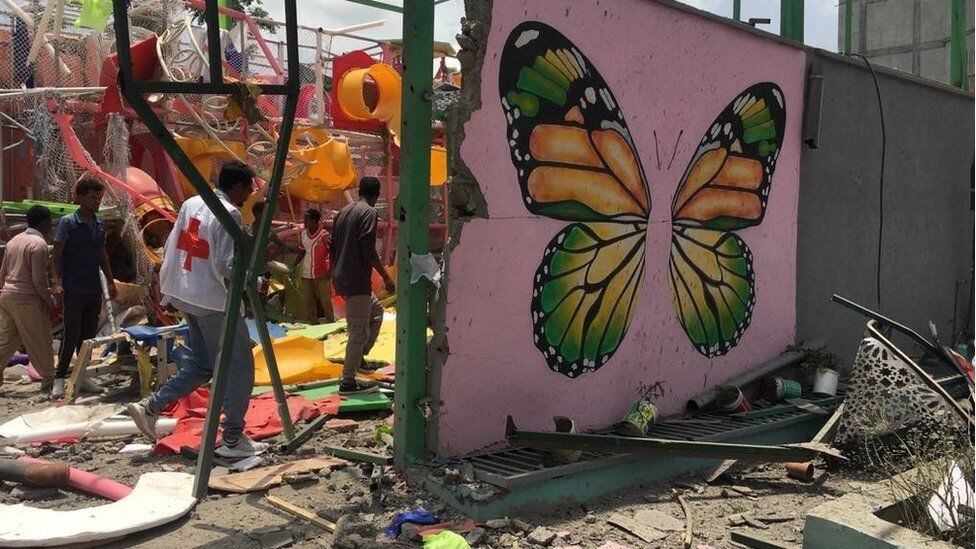
“It’s a big setback for the rebels and leaves civilians exposed to slaughter, rape and starvationDe Waal said, although the Ethiopian government has promised help and the restoration of services in Shire and other areas under its control.
One of the few humanitarian workers still in the area told the BBC, on condition of anonymity, that some 600,000 civilians have taken refuge in and around the city, after fleeing from other areas where fighting is taking place.
“More than 120,000 were out in the open, sleeping under the trees and bushes“said the aid worker.
The promises of help and protection from the authorities in Addis Ababa have not reassured the inhabitants of Shire, thousands of whom have begun to flee fearing that they may be subjected to atrocities, similar to those in other areas that fell under the control of Ethiopian and Eritrean troops.
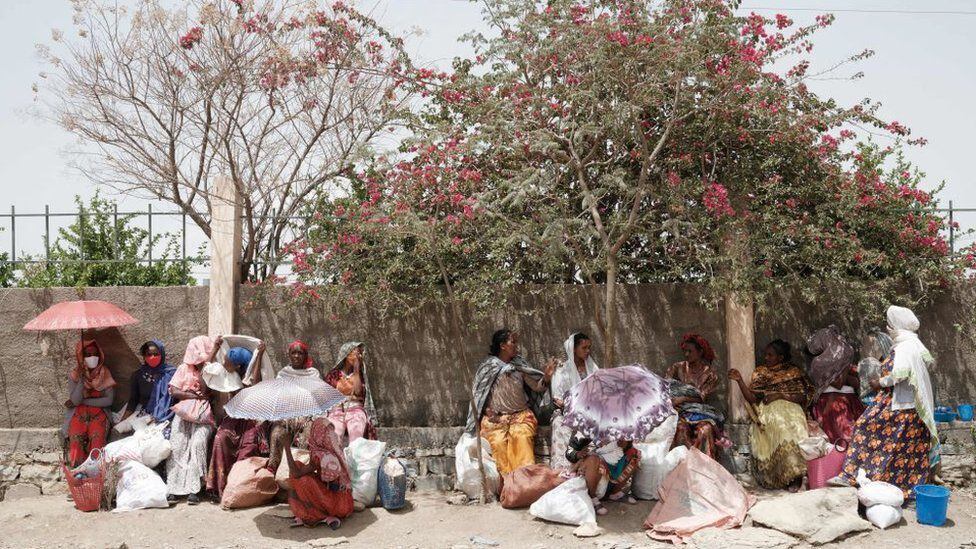
“4 witnesses reported that in the village of Shimblina, in September, 46 people were rounded up and summarily executed. Other villagers found their bodies mixed with domestic animals, which had also been slaughtered,” the aid worker said.
“Hyenas had eaten some of the bodies, and they could only be identified by the remains of their clothing. Witnesses said that they hadn’t had time to bury the bodies and that surely the hyenas should have already finished them off,” added the activist.
From inside
But the situation is serious not only in Shire and its surroundings, but also in Mekele, the capital of the region. The BBC received days ago an exclusive report from a journalist who is in the city and in which he narrates how its residents are coping with conflict. The identity of this communicator is reserved for security reasons.
In recent weeks, drones have not stopped flying over the skies of the city of Mekele, which has a population of about 300,000 inhabitants, almost every day, says the communicator who is in the area and whose identity is not revealed for security reasons. .
The latest air attacks suffered by the town, controlled by the rebel forces, have affected playgrounds and residential areaswhich indicates that it is not clear what the objectives were.
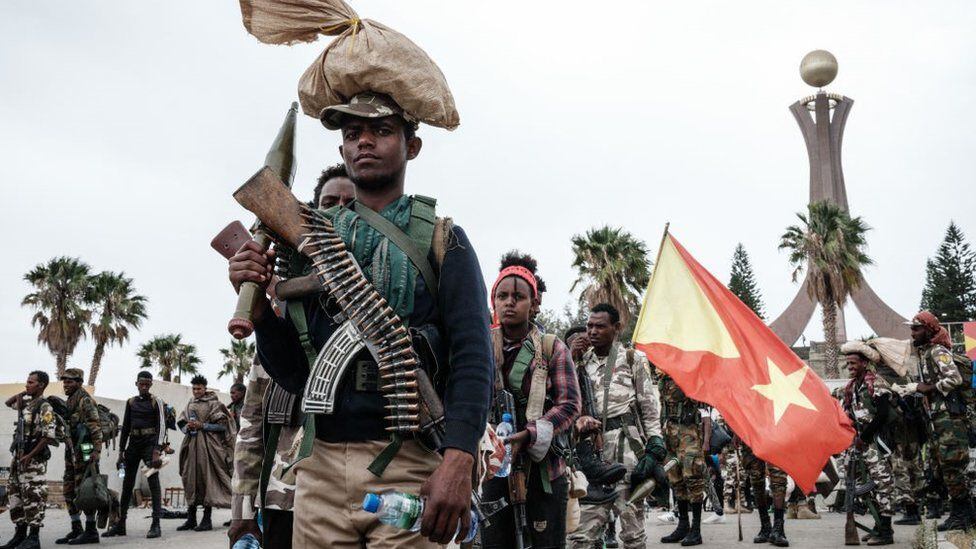
The Tigray army has this week called on all people fit to fight to join the war. And despite the fact that the population is tired of the 23 months that the fighting has already lasted, many are heeding the call.
“It is considered taboo not to join the army,” said a man, whose name the BBC does not reveal to protect him.
Ethiopian Prime Minister Abiy Ahmed, who was awarded the 2019 Nobel Peace Prize, has accused the region’s leaders of rebelling in an attempt to regain power they lost when he took office in 2018.
The latest spiral of violence began at the end of August, after the collapse of a five-month humanitarian truce.
People from all walks of life, including women, are answering the call to join the army of Tigray People’s Liberation Front (TPLF).
Among them stands out a 23-year-old girl who said she was “proud to be from Tigray and excited to have received training to protect my rights and preserve my land.”
cut off from the world
Tigray has been under lockdown since June 2021, and living conditions have only deteriorated.
“The situation in Tigray is worse than anywhere else in the world,” said Professor Yohannes Woldemariam, a professor at the University of Colorado (United States), during a conversation with the BBC.
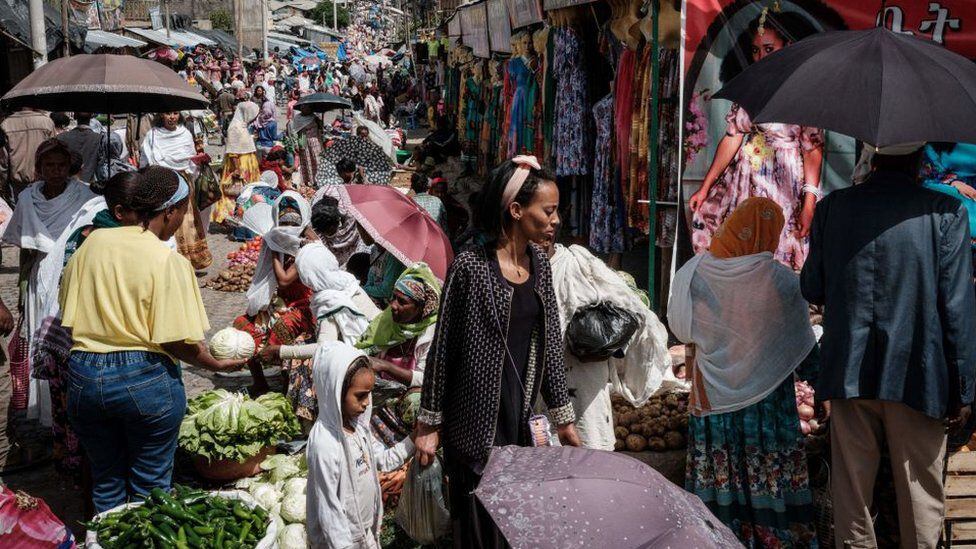
“The area has been under siege for 2 years. The conditions in which the residents live they are absolutely horrible. Even those with financial means are surviving on just one meal a day,” she said.
For more than a year, telephone lines and Internet services have been interrupted, disconnecting the region from the rest of the world.
Faced with this situation, the inhabitants have returned to using paper to write messages to their family and friends, or have to go to the border with the Ethiopian region of Amhara to make calls and receive money from their relatives residing abroad.
Groups gather around a single radio on the side of the road to find out what’s going on. Everyone talks about the peace process and follows the news about it closely, but many people believe that the Ethiopian government is not ready for talks, because has not stopped bombing.
As people cannot withdraw money from banks, because they are closed, the bulk of commerce has also stopped operating.
This has led to the emergence of open-air markets, which were illegal before the war, and the movement of cash through the black market, with brokers charging a commission of at least 30%, compared to 50% for a few months ago.
depending on the outside
Many Tigrayans survive on remittances from relatives in other countries.
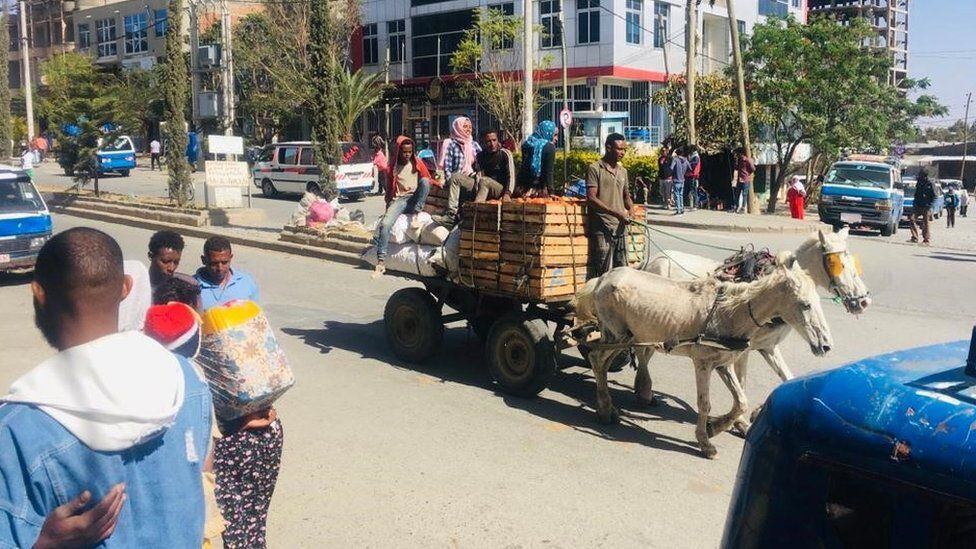
One of the neighbors interviewed by the BBC admitted that he would not be able to feed his five children without the cash sent to him by his brothers, two of whom live in the United States. The interviewee revealed that he has received money from his brothers four times since the start of the siege.
The conflict has prevented essential goods, including fuel, from reaching Tigray. Many people get around on foot or in donkey carts..
Prices, meanwhile, continue to rise. Teff, the grain commonly used to make the traditional bread known as injera, rises every week. The current price of 100 kg is around 265 dollars, compared to 85 dollars a year ago.
People are dying due to lack of medicines that cannot be brought in due to the blockade. The cost of medicines for chronic diseases has multiplied by 10.
pouring gasoline on the fire
Each new Ethiopian government airstrike not only kills more civilians, but drives more young people to join the rebel army.
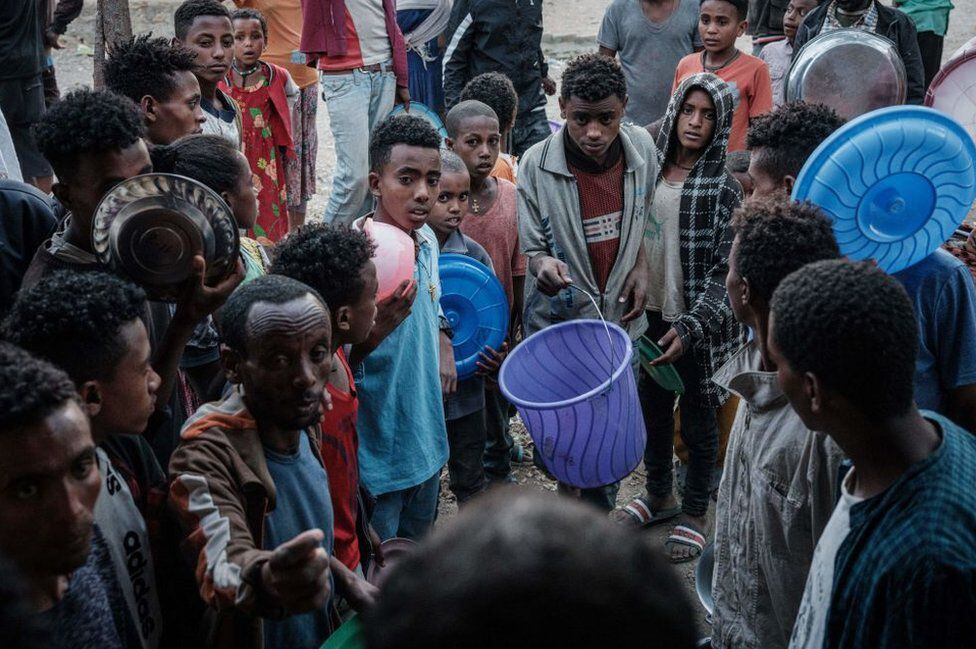
A 29-year-old woman told the BBC that three members of her family – two brothers and a sister – have joined the insurgent forces.
The woman, meanwhile, revealed that she has spent the last two months preparing food for the fighters at the front.
Other residents are sharing their food with the families of those who have gone to fight.
The news that the peace talks, under the auspices of the African Union, could start shortly South Africa has been well received by Tigrayans.
In the meantime, however, the churches and mosques are filled every night with people praying that the politicians will be able to reach an agreement to end the war.
Source: Elcomercio
I, Ronald Payne, am a journalist and author who dedicated his life to telling the stories that need to be said. I have over 7 years of experience as a reporter and editor, covering everything from politics to business to crime.

:quality(75)/cloudfront-us-east-1.images.arcpublishing.com/elcomercio/GU4DCMBNGEYC2MRQKQYDAORVHA.jpg)





